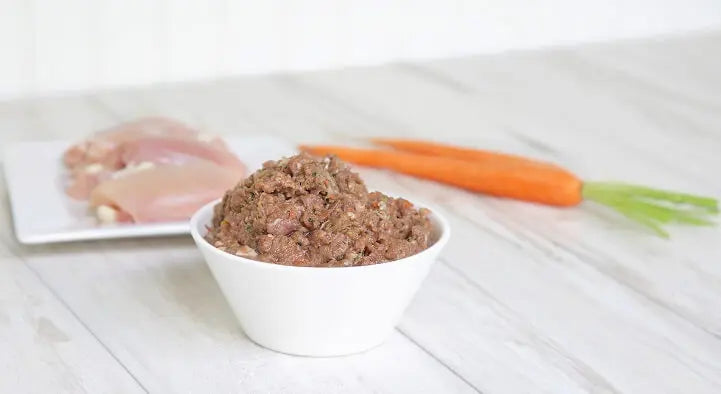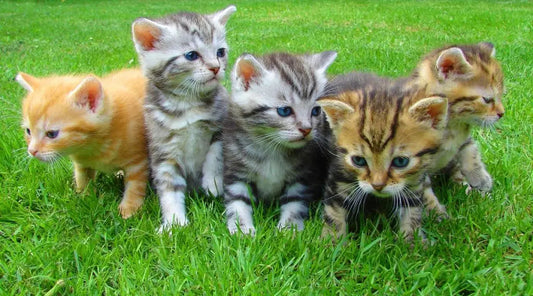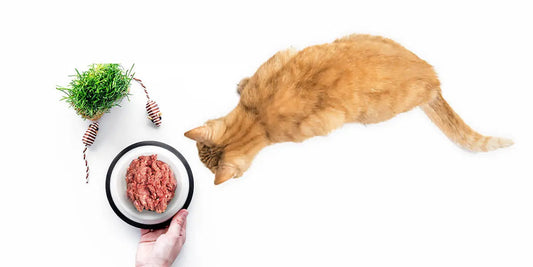
Are Chicken Hearts Good for Cats? Here's What You Should Know
Every cat needs a balanced diet that provides essential nutrients based on their age, activity level, and any underlying health conditions. In addition to commercial cat food, some pet owners like to offer nutrient-rich treats to support their cat’s overall wellness. One such option is chicken hearts. In this article, we’ll explore the nutritional value of chicken hearts and answer the question: Are chicken hearts a healthy and safe treat for cats?
Why Chicken Hearts Are a Nutritional Win for Cats
Is chicken good for cats? Yes—and that includes nutrient-dense organ meats like chicken hearts. Both cooked and freeze-dried chicken hearts are considered safe and biologically appropriate for cats when fed in moderation. These treats provide lean protein, beneficial fatty acids, and essential micronutrients. While cooking may reduce some nutrient content, it helps eliminate harmful bacteria. Freeze-drying, on the other hand, preserves most of the nutritional value while still ensuring safety by removing moisture and pathogens. Whether cooked or freeze-dried, chicken hearts can be a wholesome, protein-rich addition to your cat’s diet.
Chicken hearts are muscle meat crammed with nutrients that are vital for dogs and cats. Below is the approximate nutritional composition per 100g of cooked chicken hearts:
-
185 calories
-
26g protein
-
8g fat
-
Essential minerals: zinc, copper, iron, selenium, and phosphorus
-
B-complex vitamins: B12, B2 (riboflavin), B3 (niacin), B5 (pantothenic acid), and B9 (folate)
Among the many health benefits they provide, chicken hearts improve heart health, blood supply, and overall well-being. One of the most important nutrients in chicken hearts is taurine, an essential amino acid for cats that supports cardiac function, retinal health, and overall metabolism. Cats cannot synthesize taurine within their bodies, so the only way to obtain it is through their diet.
Are Chicken Hearts Safe for Cats to Eat?
Cats enjoy the smell and taste of cooked chicken hearts and will instantly rush to get them. Remember, even though we have domesticated cats, they are still ferocious hunters who will love wild treats. Even cats who are selective eaters will love them. Yes, you might need to bring it up to their nose for a sniff. They might turn their nose at first and demand a familiar treat. But once they get their first bite, cats love chicken hearts. And for pet parents wondering whether “is turkey good for cats” or “is beef good for cats”, the answer is yes, in moderation. Like chicken hearts, these proteins offer valuable nutrients, especially when sourced from high-quality ingredients.
When properly handled and prepared, chicken hearts are generally safe for cats and well-tolerated. They are rich in protein and vitamins, providing an essential meal for cats’ heart health and vision. To minimize the risks, always purchase fresh meat and handle it with proper hygiene to reduce the risk of bacterial or parasitic contamination.
Cats can eat chicken hearts as raw meat, or you can consider freeze-dried chicken hearts as a safe and convenient treat. These cat treats are free of preservatives and offer a long shelf life without losing nutrients. For pet owners who have concerns regarding raw feeding and raw food, freeze-dried chicken hearts are a great alternative. You can also consider raw chicken and duck for cats as another excellent combination for protein variety.
Choosing the Best Form: Raw, Cooked, or Freeze-Dried
Each form—raw, cooked, or freeze-dried—has its own benefits, but cooked or freeze-dried options are generally recommended unless you’re experienced with safe raw feeding practices. Whatever the case, cats should not consume chicken hearts daily. To ensure a balanced diet, cats should get no more than 5 oz (150g) of chicken hearts per week. The best option is to feed the cat minimally processed chicken hearts. If you opt for raw feeding, always source fresh meat.
How to Feed Chicken Hearts to Your Cat
Most cats that follow a complete and balanced fresh cat food do not need supplementation. However, there is nothing wrong with adding a few more treats to give your cat some rewards. If you decide to prepare chicken hearts yourself, minimal processing is the best way to preserve their nutritional value. You can boil, steam, grill, or bake them for about 10 to 15 minutes—just be sure to avoid using oils, salt, or seasonings that could upset your cat’s digestive system. If you need to prevent sticking in a pan, a very small amount of unsalted butter is a safer alternative. Simple preparation keeps the snack healthy, safe, and digestible for your cat.
Portion control is key. Adult cats can have two to three pieces per day. However, it is best that you avoid feeding them every day. Cats with dental issues may benefit from finely chopped or shredded pieces. Before giving them to your cat, keep the chicken hearts at room temperature to avoid any digestive issues.
Chicken hearts are rich in important nutrients, and they provide vital benefits for a cat’s health. However, because of their high protein content, you should not feed them too frequently.
Shop Chicken Hearts at Darwin’s
Why worry about cooking chicken hearts yourself when you can trust Darwin’s to deliver safe, nutritious, and ready-to-serve treats your cat will love?
At Darwin’s Pet, we believe that every pet deserves the best life possible. We strive to deliver the best possible quality food and pet treats for your favorite furries. Our freeze-dried raw chicken hearts are perfect for travel or as a snack for your pet. All natural and made with human-grade ingredients sourced in the US, we deliver premium snacks for your pet. Remember, they are designed as treats, not as a substitute for your cat’s meal.


